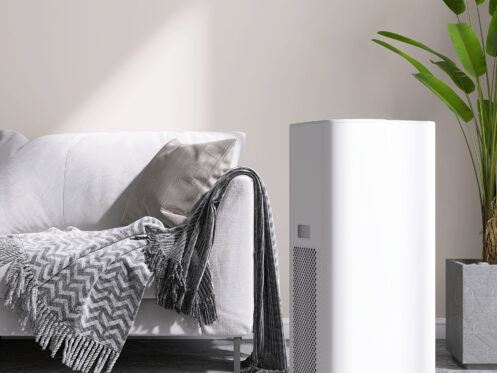The colder it is outside, the harder the heater has to work to keep your home warm and cozy. All of this extra strain reduces the heater’s efficiency as well as its ability to effectively filter the air. Fortunately, there are several tips you can follow to improve your household’s indoor air quality during the winter in Sonora.
How Does Cold Weather Affect Indoor Air Quality?
Cold weather affects indoor air quality in several ways. Because cooler temperatures result in homeowners keeping their windows and doors tightly shut, this reduces ventilation. This can lead to a buildup of indoor pollutants, including volatile organic compounds (VOCs) from household products. VOCs are everywhere, including in paints, cleaning products, and furniture. Many scientific studies link VOCs to respiratory problems and other ailments.
Cold weather also affects indoor air quality because cold air holds less moisture than warm air. Low humidity in a house increases the risk of airborne viruses and can lead to respiratory problems. Furthermore, when people stay inside more because it’s cold outside, allergens like dust mites, pet dander, and mold tend to become more concentrated. This makes the indoor air quality especially worse for those who suffer from allergies or asthma.
Increase Ventilation
One of the best ways to improve indoor air quality during the winter is to regularly vent your house by opening windows and doors for a few minutes, despite the chilly weather. Doing so brings in clean air while removing stale air from inside the home.
Change the Air Filter
Changing the furnace filter periodically makes a big difference in the quality of air inside pf your house during the colder months. A clean filter is necessary for preserving indoor air quality because it reduces the circulation of allergens, dust, and other particles. Plus, if the air isn’t dirty, the heater will have an easier time keeping the room at the proper temperature.
Use a Humidifier
Heating systems significantly remove moisture from the already dry, cold air. Using a humidifier can help keep interior humidity levels where they should be, which improves indoor air quality. Using a humidifier to achieve a humidity level of 30% to 50% helps protect mucous membranes from drying out. This, in turn, alleviates respiratory irritation, slows the transmission of infections, and boosts general health.
Now that you understand how cold weather impacts your home’s indoor air quality, it’s time to schedule any repairs or maintenance that the heater needs. Here at Gatewood Heating & Air Conditioning, Inc., we help Sonora homeowners with heater maintenance and repairs as well as indoor air quality testing, ventilation systems, thermostat devices, and cooling services. Give us a call today to learn more about keeping your home comfortable this winter with healthier indoor air.

